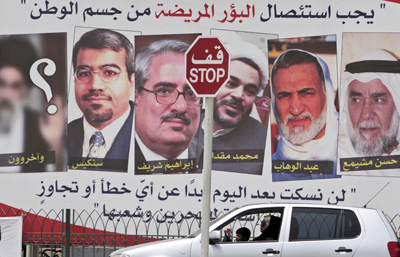New York, June 22, 2011–The Committee to Protect Journalists condemns today’s politicized verdict in which 21 bloggers, human rights activists, and members of the political opposition were found guilty of plotting to topple the monarchy. Today’s court ruling further cements 2011 as the worst year for press freedom in Bahrain since the island kingdom declared its independence in 1971.
Among the 21 men convicted are two bloggers, Abduljalil Alsingace and Ali Abdel Imam, as well as prominent human rights activist Abdulhadi al-Khawaja. Alsingace and al-Khawaja were sentenced to life imprisonment, while Abdel Imam was sentenced to 15 years in prison in absentia, the official Bahrain News Agency said. They were found guilty of 12 anti-state charges, most significantly “organizing and managing a terrorist group for the overthrow and the change of the country’s constitution and the royal rule” and “attempting to incite and solicit the overthrow and change the country’s constitution and royal rule by force.”
“The charges against Alsingace, Abdel Imam, al-Khawaja, and their 18 codefendants are nothing more than political score-settling,” said CPJ Middle East and North Africa Program Coordinator Mohamed Abdel Dayem. “Through its actions, the government of Bahrain has displayed a stunning disregard for due process and basic human rights. It is now incumbent on the international community, and particularly the kingdom’s closest allies, to unambiguously convey to Bahrain that such blatant contempt for basic rights will not be tolerated.”
The trial, ongoing since early May, has been plagued by legal and procedural shortcomings, CPJ research shows. Local, regional, and international rights groups have also documented irregularities.
The accused were tried by the Court of National Safety, an extraordinary tribunal made up of civilian and military judges established after the imposition of martial law in Bahrain in March. The court, described by some legal experts as unconstitutional, has continued to operate after the lifting of martial law in May. Additionally, family members of the detained men, the Bahrain Center for Human Rights, and international human rights groups have reported that the court refused to hear testimony or examine evidence of torture. International observers said they were not allowed to attend multiple sessions of the trial, despite government assurances that they would be able, CPJ research shows.
Abdel Imam, a leading online journalist, was initially arrested in September on charges of spreading “false information” while Alsingace, a blogger and human rights activist, was detained in August after accusations of having abused “the freedom of opinion and expression prevailing in the kingdom,” an unnamed security official told local media. Both were released as part of a royal amnesty in late February after the eruption of social unrest. Alsingace was rearrested and Abdel Imam went into hiding in March 2011, news reports said. Al-Khawaja, one of Bahrain’s most prominent human rights activists, is the founder and former director of the Bahrain Center for Human Rights. He is also the former regional director of the Dublin-based international human rights organization Frontline Defenders. He has been arrested and tortured in relation to his human rights advocacy multiple times in recent years, according to CPJ research.
CPJ has documented dozens of cases of journalist detentions in Bahrain, the death in custody of two journalists, the shutdown of the country’s premier independent daily, arbitrary deportations, an orchestrated smear campaign against independent journalists and activists, and a large number of physical assaults against reporters since mid-February.
EDITOR’S NOTE: The original text of the alert said both Abduljalil Alsingace and Ali Abdel Imam were arrested in March 2011, citing news reports. This is incorrect. Abdel Imam went into hiding and was tried in absentia.
